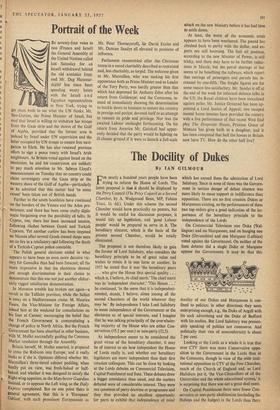Portrait of the Week
BY seventy-four votes to two (France and Israel) the General Assembly of the United Nations called last Saturday for an Israeli withdrawal behind the old armistice lines; and Mr. Dag Hammar- skjold has since been spending weary hours with the Israeli a n d Egyptian representatives in New York, trying to get them both to see what the UN thinks. Mr.
Ben-Gurion, the Prime Minister of Israel, has said that Israel is willing to withdraw her troops from the Gaza strip and the shores of the Gulf of Aqaba, provided that the former area is policed by Israel under UN supervision and the latter occupied by UN troops to ensure free navi- gation to Elath. He has also renewed previous offers to sign a peace treaty with Israel's Arab neighbours. As Britain voted against Israel on the resolution, he and his countrymen are unlikely to pay much attention to Mr. Selwyn Lloyd's announcement on Tuesday that no country could claim sovereignty over the Gaza strip or the Western shore of the Gulf of Aqaba—particularly as he admitted that this matter had `to some extent' been taken out of British hands.
Farther to the south hostilities have continued on the borders of the Yemen and the Aden pro- tectorate, and there has been some crafty diplo- matic bargaining over the possibility of talks. In Cyprus, too, there has been increased tension, following clashes between Greek and Turkish Cypriots. Yet another curfew has been imposed on Nicosia after several Greek-owned shops were set on fire in a retaliatory raid following the death of a Turkish-Cypriot police constable.
The Polish general elections ended in what appears to have been an even more decisive vic- tory for Gomulka than had been forecast; all the more impressive in that the electorate showed just enough discrimination in their choice to demonstrate that this was not just another elabor- ately rigged totalitarian demonstration.
In Morocco trouble has broken out again—a revolt in the Tafilalet province, while the Sultan is away on a Mediterranean cruise. M. Maurice Faure, the Vice-Minister for Foreign Affairs, joined him at the weekend for consultations on his liner at Cannes; encouraging the belief that the French Government is contemplating a change of policy in North Africa. But the French Government has been absorbed in other business, With M. Mollet successfully guiding the Common Market resolution through the Assembly.
Britain herself, M. Mollet asserted, is prepared to cross the Rubicon into Europe; and it really looks as if she is. Opinions differed whether Mr. Macmillan's three-tiered cabinet pudding, when finally put on view, was fresh-baked or half- baked; and whether it was designed to satisfy the Right-wing appetites, as the Manchester Guardian Insisted, or to appease the. Left wing, as the Daily Express complained. But on one point there is general agreement, that this is a `European' Cabinet, with such prominent Europeanists as Mr. Peter Thorneycroft, Sir David Eccles and Mr. Duncan Sandys all elevated to positions of influence.
Parliament reassembled after the Christmas recess in a mood charitably described as restrained and, less charitably, as torpid. The welcome given to Mr. Macmillan, who was making his first appearance both as Prime Minister and as Leader of the Tory Party, was hardly greater than that which had depressed Sir Anthony Eden after his return from Goldencye; and the Commons, in- stead of immediately showing the determination to buckle down to business to restore the country in prestige and pocket, devoted itself to an attempt to reassert its pride and privilege. Nor was the awaited Labour onslaught forthcoming. On his return from America Mr. Gaitskell had appar- ently decided that the party would be fighting on ill-chosen ground if it were to launch a full-scale attack on the new Ministry before it has had time to settle down.
At least, the worst of the economic crisis appears to have been weathered. The pound has climbed back to parity with the dollar, and ex- ports are still booming. The fuel oil position, according to the new Minister of Power, is still tricky, and there may have to be further reduc- tions in March; but the petrol shortage at last seems to be benefiting the railways, which report that carriage of passengers and parcels has in- creased by one-fifth. The freight figures arc for some reason less satisfactory. Mr. Sandys is off at the end of the week for informal defence talks in the US; the Royal children have been inoculated against polio; Mr. Justice Ormerod has been ap- pointed a Lord Justice of Appeal; two escaped mental home inmates have provided the country with a live performance of that recent West End play The Desperate Hours; Princess Grace of Monaco has given birth to a daughter; and it has been computed that half the homes in Britain now have TV. How do the other half live?


































 Previous page
Previous page